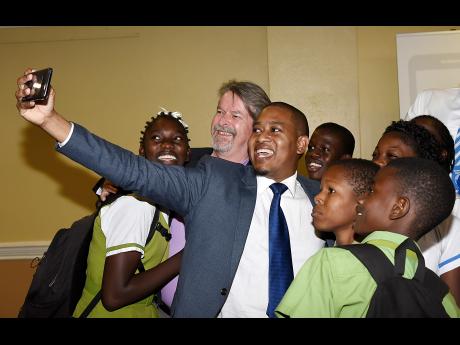UNICEF to continue to fight for children
At UNICEF Jamaica, we are a small team dedicated to one big goal: to fulfil the rights of every Jamaican child. Most of our staff members are Jamaicans. We are all very disheartened when any child is harmed or has their rights violated in any way. We are committed to preventing this as much as we can. None of UNICEF's work is possible without our partners. We work closely with a range of government and non-governmental partners, providing both technical and financial support for various efforts in the areas of safety and justice, lifelong learning, health promotion and social protection.
2018 HIGHLIGHTS
UNICEF published the Situation Analysis of Jamaican Children, which provides a sweeping overview of major challenges and opportunities in the areas of protection, health, education, social protection and the environment. One of the most urgent and unsettling issues covered in the report is the persistently high levels of violence against children.
We shared preliminary findings of a comprehensive UNICEF-supported study about Jamaican children in state care, which examines how and why children are placed in state care and the quality of care provided. The groundbreaking study is being conducted by Jamaicans for Justice, in consultation with the Child Protection and Family Services Agency (CPFSA) and the Office of the Children's Advocate (OCA). The ultimate aim of the research is to make the case for the de-institutionalisation of children.
... 300 youth trained
Through our partnership with the Peace Management Initiative (PMI), we facilitated the participation of 300 youth ages 15 to 19 who were at high risk of getting involved with gangs and violence in gang demobilisation, life skills and behaviour change workshops. One hundred and twenty of them were referred to various job and training opportunities, steering them away from an otherwise dangerous path.
We also worked closely with the PMI, Fight for Peace and the Ministry of Health's Bounce Back programme to train community residents and resource persons to deliver services in psychological first aid - an approach that helps children, adults and families in the immediate aftermath of a violent or traumatic incident, helping them to reduce initial distress and with coping in the short and long-term.
We supported the OCA in training more than 90 police officers, of various ranks, to implement the child justice guidelines - which outline standards for how professionals throughout the justice system should interact with children who come into contact/conflict with the law - in ways that respect their rights and dignity. More officers will be trained in the near future.
Over the last five years, more than 120 children have died on the roads due to accidents. Through a collaborative effort with UNICEF and the FIA and Abert is Foundations, the Jamaica National Foundation launched a national road safety campaign 'X Marks the Spot'. The initiative is based on the findings of a national assessment and will make infrastructural improvements outside of 18 schools in high road injury risk areas over the next three years.
We continued training school personnel in the School Wide Positive Behaviour Intervention and Support (SWPBIS) framework - a major effort to reduce violence and promote positive values that has been piloted in 56 schools in partnership with the Ministry of Education, Youth and Information. Over 5,000 educators have been exposed to the methodology and 2,500 trained.
We continued to expand our work for children with disabilities. With our support, Special Olympics Jamaica completed the 'There is an I Can in every Jamaican' outreach expansion project, which increased its number of clinical volunteers to over 100, screened close to 1,000 children, promoted and supported the growth of unified sports and provided much-needed equipment to facilitate health screenings outside of the Kingston and Metropolitan area.
We supported the Digicel Foundation and the Jamaica Council for Persons with Disabilities to increase the number of children with disabilities who are officially registered, to help ensure they have access to key services. Together, we developed a comprehensive Situation Analysis on Persons with Disabilities and a media campaign to promote inclusion and empowerment. Both will be launched during Disabilities Awareness Week in December.
Through our work with the Ministry of Health, an additional 21 health facilities (now a total 38 facilities) are implementing adolescent health standards to improve service delivery and uptake in services among adolescent girls and boys.
... Focus on youth engagement
We contributed to Jamaica becoming the first country in the Caribbean to launch 'U-Report' - a free social messaging tool pioneered by UNICEF and used globally by over five million young people. U-Report provides a platform for Jamaican youth ages 13-29 to become U-Reporters via facebook and Twitter and add their voice to matters of national importance. FLOW partnered with UNICEF to provide free sign-up via SMS text messaging for FLOW users.
As a 'Pathfinder' country under the Global Partnership to End Violence against Children, Jamaica has committed to take accelerated action to prevent and respond to violence against children. We supported the completion of the Pathfinder Country Roadmap, which sets out the action plan for doing this, and is linked to the updated National Plan for an Integrated Response to Children and Violence 2018 to 2023.
We also welcomed the passing of the Child Diversion Act-- a significant milestone after many years of advocacy. UNICEF supported the development of the National Policy on Child Diversion that informed the legislation, and we will continue to support the operationalisation of the Act.
MAJOR FOCUS AREAS FOR 2019
Increase our advocacy for zero tolerance of all forms of violence against children, in all settings - including the use of violent discipline in schools. In connection, we aim to expand the SWBIS framework, which is featured as an effective solution for preventing and reducing violence in the Pathfinder Country Roadmap. We will also invest in parenting education to promote positive and non-violent practices.
Strengthen our support for adolescent health including mental health and access to quality health services for adolescents - with a strong focus on reducing adolescent pregnancies and preventing HIV/STIs.
Put greater focus on supporting children with disabilities from the early childhood level, through enhanced social protection measures and inclusive social services.



